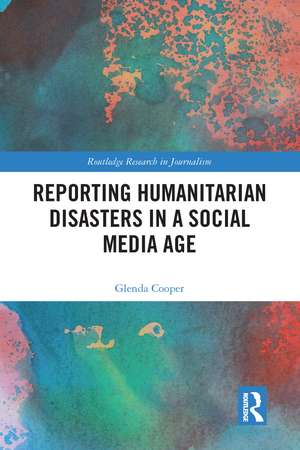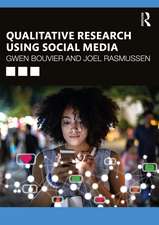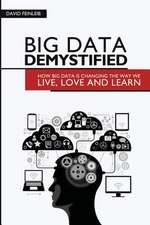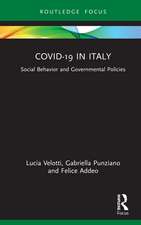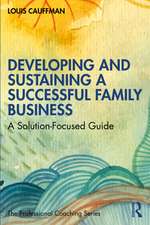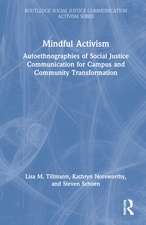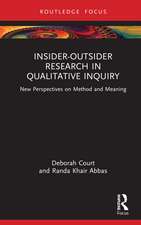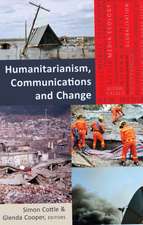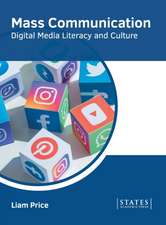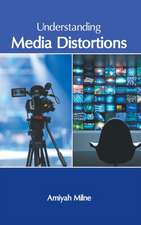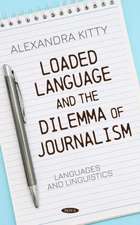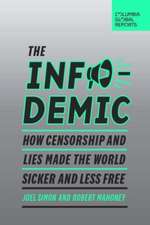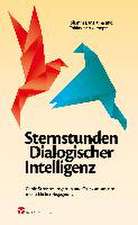Reporting Humanitarian Disasters in a Social Media Age: Routledge Research in Journalism
Autor Glenda Cooperen Limba Engleză Paperback – 30 iun 2020
| Toate formatele și edițiile | Preț | Express |
|---|---|---|
| Paperback (1) | 372.08 lei 6-8 săpt. | |
| Taylor & Francis – 30 iun 2020 | 372.08 lei 6-8 săpt. | |
| Hardback (1) | 765.01 lei 6-8 săpt. | |
| Taylor & Francis – 22 oct 2018 | 765.01 lei 6-8 săpt. |
Din seria Routledge Research in Journalism
-
 Preț: 310.60 lei
Preț: 310.60 lei - 9%
 Preț: 1006.49 lei
Preț: 1006.49 lei -
 Preț: 272.79 lei
Preț: 272.79 lei -
 Preț: 311.33 lei
Preț: 311.33 lei -
 Preț: 318.82 lei
Preț: 318.82 lei - 9%
 Preț: 935.50 lei
Preț: 935.50 lei -
 Preț: 309.79 lei
Preț: 309.79 lei -
 Preț: 301.58 lei
Preț: 301.58 lei -
 Preț: 302.60 lei
Preț: 302.60 lei -
 Preț: 334.02 lei
Preț: 334.02 lei - 13%
 Preț: 289.66 lei
Preț: 289.66 lei - 13%
 Preț: 289.78 lei
Preț: 289.78 lei -
 Preț: 376.10 lei
Preț: 376.10 lei - 13%
 Preț: 329.97 lei
Preț: 329.97 lei -
 Preț: 389.60 lei
Preț: 389.60 lei -
 Preț: 371.31 lei
Preț: 371.31 lei - 18%
 Preț: 998.71 lei
Preț: 998.71 lei -
 Preț: 395.56 lei
Preț: 395.56 lei - 16%
 Preț: 263.77 lei
Preț: 263.77 lei -
 Preț: 442.50 lei
Preț: 442.50 lei -
 Preț: 376.10 lei
Preț: 376.10 lei - 18%
 Preț: 1001.07 lei
Preț: 1001.07 lei -
 Preț: 369.19 lei
Preț: 369.19 lei - 15%
 Preț: 209.80 lei
Preț: 209.80 lei - 43%
 Preț: 188.21 lei
Preț: 188.21 lei - 26%
 Preț: 763.13 lei
Preț: 763.13 lei - 18%
 Preț: 1003.75 lei
Preț: 1003.75 lei - 18%
 Preț: 1052.35 lei
Preț: 1052.35 lei -
 Preț: 376.10 lei
Preț: 376.10 lei -
 Preț: 389.38 lei
Preț: 389.38 lei -
 Preț: 382.86 lei
Preț: 382.86 lei - 18%
 Preț: 1001.07 lei
Preț: 1001.07 lei -
 Preț: 422.59 lei
Preț: 422.59 lei
Preț: 372.08 lei
Nou
Puncte Express: 558
Preț estimativ în valută:
71.20€ • 74.54$ • 58.91£
71.20€ • 74.54$ • 58.91£
Carte tipărită la comandă
Livrare economică 05-19 aprilie
Preluare comenzi: 021 569.72.76
Specificații
ISBN-13: 9780367584191
ISBN-10: 0367584190
Pagini: 260
Dimensiuni: 152 x 229 x 15 mm
Greutate: 0.36 kg
Ediția:1
Editura: Taylor & Francis
Colecția Routledge
Seria Routledge Research in Journalism
Locul publicării:Oxford, United Kingdom
ISBN-10: 0367584190
Pagini: 260
Dimensiuni: 152 x 229 x 15 mm
Greutate: 0.36 kg
Ediția:1
Editura: Taylor & Francis
Colecția Routledge
Seria Routledge Research in Journalism
Locul publicării:Oxford, United Kingdom
Public țintă
Postgraduate and UndergraduateCuprins
1. Introduction: Telling the Stories of Disasters in a Rapidly Changing World 2. Distant Suffering in a Digital World: background to the changing nature of disaster reporting 3. ‘The odd mucky weekend – not a one night stand’. How journalists and aid agencies work together in disasters 4. ‘The First Draft of History’ or ‘Smoke and Mirrors’? How journalists and aid agencies see UGC 5. Twitter takeovers and Following the Sun: How aid agencies now use UGC 6. Cloning and Co-opting: Journalists and control of UGC 7. ‘Tweeting the Quake’ How ordinary citizens tell their stories 8. Ethical Questions Going Forward: Privacy, Permission, Payment 9. Conclusion: Final Reflections
Notă biografică
Dr Glenda Cooper is a lecturer in journalism at City, University of London. Her research centres on humanitarian disasters, the relationship between aid agencies and journalists and the ethical issues surrounding use of user-generated content. She is the co-editor ofHumanitarianism, Communications and Change(Peter Lang, 2015), and editor ofThe Future of Humanitarian Reporting(City University, 2014). Before that, she was the Guardian Research Fellow at Nuffield College, Oxford and a staff journalist at the BBC,Independent, Daily Mail, Washington Post, Sunday Timesand theDaily Telegraph.
Recenzii
'What is often been theorized upon and dealt with in highly hypothetical ways, has finally met its empirical match. Drawing on an impressive amount of interviews with journalists, aid agency press officers but especially with ordinary citizens posting on social media, Dr. Glenda Cooper offers an insightful and detailed inquiry into the role of UGC and forms of citizen journalism in reporting on international humanitarian disasters. The book asks compelling and topical questions about privacy, ethics and journalistic practices in this new digital age of social media.' -Stijn Joye, Ghent University, Belgium
Descriere
Defining images and accounts of humanitarian crises are now often created not by journalists but by ordinary citizens using social media. This book reveals how humanitarian disasters are covered in the 21st century – and the potential consequences for those who posted a tweet, a video or photo without realising how far it would go.
